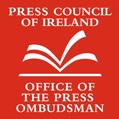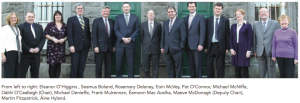 With the recent publication by the Press Council and the Office of the Press Ombudsman of their Annual Report 2010 (Report (pdf) | Press Release), it is an opportune time to consider whether the system of press self-regulation by those two bodies is working. I think that, overall, the answer must be yes. Within the remit afforded to the Ombudsman and Press Council, they are working very well indeed. The Ombudsman and Council are energetic in spreading the word about the speedy form of redress which they operate; the growing numbers of member-periodicals show that the industry has embraced the system; and the numbers of complaints show that an increasingly-aware public are taking advantage of it. Apart from the figures, 2010 saw two very important developments: the recogition of the Ombudsman and Council pursuant to the Defamation Act, 2009 (also here); and the extension of their remit to purely online publications.
With the recent publication by the Press Council and the Office of the Press Ombudsman of their Annual Report 2010 (Report (pdf) | Press Release), it is an opportune time to consider whether the system of press self-regulation by those two bodies is working. I think that, overall, the answer must be yes. Within the remit afforded to the Ombudsman and Press Council, they are working very well indeed. The Ombudsman and Council are energetic in spreading the word about the speedy form of redress which they operate; the growing numbers of member-periodicals show that the industry has embraced the system; and the numbers of complaints show that an increasingly-aware public are taking advantage of it. Apart from the figures, 2010 saw two very important developments: the recogition of the Ombudsman and Council pursuant to the Defamation Act, 2009 (also here); and the extension of their remit to purely online publications.
As the Council’s new Chairman, Dáithí O’Ceallaigh, notes in his Introduction to the Report, the year covered by the Report began with the coming into force of the Defamation Act, 2009, section 44 and Schedule 2 of which allowed for the formal recognition of the Press Council, which duly followed in April:
This has been no mere formality, but a significant and public recognition of the degree to which these new structures, since their institution in 2007, have met the exacting requirements laid down for recognition in the Act, and have contributed to the climate of enhanced accountability and public service within which our press industry operates.
It is the final step in a long, but stately and carefully choegraphed, dance, which began with the publication of the Report of the Legal Advisory Group on Defamation in 2003 (pdf), and proceeded via the establishment by the press of the Ombudsman and Council, through the publication of the Defamation Bill, 2006 and its enactment in 2009, to this recognition. Perhaps emboldened by it, the Ombudsman and Council are becoming more visible and more muscular.
One example of that is the extension of their remit to online publications. Speaking at the launch, the Chairman, Mr O’Ceallaigh, commented
that publications that are not as yet members, as well as web-based publications, will in time come to see the value of quality control and best professional practice. When this happens – and at least one web-based news organisation has already been accepted as one of the recent new member publications of the Council – we are ready to play a positive role in the light of our own experience and in support of the highest possible journalistic standards.
This marks a significant – and welcome – change of heart on the part of the Press Council. I am almost certain that I remember Mr O’Ceallaigh’s predecessor, Prof Tom Mitchell, speaking at a seminar on “Media, Society, Defamation – A New Era” organised by Hayes Solicitors in January of last year, answering a question after his paper by saying that the Council at that stage wasn’t expecting membership applications from exclusively online publications. This was not long after the remit of the Press Complaints Commission in the UK was extended to reach exclusively online publications; indeed, the PCC has recently issued guidelines for the prominence of PCC remedies as published in online publication. I am delighted that the Ombudsman and Council are now heading in this direction. I was unconvinced (and disappointed) that the Act would allow for this, though, as TJ has pointed out
the last Minister for Justice later took a contrary view, claiming that:
The question of whether publications existing “on-line” only, either now or in the future, wish to come under the umbrella of the Press Council – and abide by its code of practice – is a matter for those publications. Nothing in the Defamation Act precludes this. Neither have I noticed any express limitation of jurisdiction in the Articles of Association of the Press Council on membership by on-line publications. Some recent commentary from media experts seems to have missed this point.
The Press Council itself has now clearly taken the position that online-only periodicals are eligible for membership, which will certainly cause a number of Irish websites to consider joining.
One note of caution, however: it will ultimately be for a court to determine whether an online-only site is a “periodical” for the purposes of the defence of fair and reasonable publication. The views of the Press Council on this point will be relevant but certainly not conclusive.
 That note of caution to one side, I am delighted to see that the Ombusdman and Council are now taking a wide view of what constitutes a publication. So, among those listed in the Report (pp22-26) and on the website, there are many (national, local and specialist) newspapers and magazines, including student publications, free-sheets, trade union magazines, and yearbooks. The website doesn’t yet say which web-based news organisation has recently been accepted as a member publication of the Council, but I understand that it is the always-entertaining observer of all things GAA, An Fear Rua (image right), and I look forward to others following in its clickstream.
That note of caution to one side, I am delighted to see that the Ombusdman and Council are now taking a wide view of what constitutes a publication. So, among those listed in the Report (pp22-26) and on the website, there are many (national, local and specialist) newspapers and magazines, including student publications, free-sheets, trade union magazines, and yearbooks. The website doesn’t yet say which web-based news organisation has recently been accepted as a member publication of the Council, but I understand that it is the always-entertaining observer of all things GAA, An Fear Rua (image right), and I look forward to others following in its clickstream.
As to the figures, the Ombudsman and Council dealt with 91 complaints in 2010 (p16) but 224 others were not processed for various reasons (p17). The majority of complaints alleged breach of Principle 1 of the Code of Practice (Truth and Accuracy), followed closely by complaints under Principle 5 (Privacy) (p15). Of the 53 which actually proceeded to decision by the Ombudsman, 18 complaints were upheld (about 20%). Of the 91 cases before the Ombudsman, 32 cases proceeded to Press Council, and the Ombudsman’s decisions were upheld in all but one of these cases (p16):
The appeal that was upheld related to a complaint about two articles published in the Irish Daily Star covering the death in tragic circumstances of the complainant’s father. The complainant’s father had previously come to public attention after a high-profile incident involving a public figure. He had been hospitalised with a mental illness, and had subsequently taken his own life. The complainant maintained that the articles had not taken the feelings of the grieving family into account, as provided for in Principle 5.3 of the Code of Practice, particularly as the articles were published the day after the man was buried, and the family had not been contacted in advance of publication.
The Press Ombudsman’s decision was that while newspapers are entitled to inform the public of newsworthy but tragic events, Principle 5.3 of the Code provides that the feelings of grieving families should be taken into account when publishing such information in situations of personal grief or shock, and that this Principle was especially relevant in circumstances involving the extremely sensitive issues of mental health and suicide. He therefore upheld this part of the complaint.
The newspaper appealed the Press Ombudsman’s decision to the Press Council. The Press Council decided that the coverage was largely factual in nature and that it did not treat the tragic death unsympathetically. It therefore decided that while the timing of the report was unfortunate from the point of view of the family, the story was a current one, and the Council therefore upheld the publication’s appeal against the decision of the Press Ombudsman. [p5]
The Ombudsman can, at his discretion, refer a significant or complex complaint directly to the Press Council, at the end of the conciliation process, and without any decision being taken by the Ombudsman. He made two such referrals in 2010. The first was a complaint by Ryanair against the Irish Times, in which the Council decided that the subsequent correction of a misleading headline sufficiently remedied any breach of the Code by the misleading headline, and that any breach of Principle 3 (Fairness and Honesty) was sufficiently remedied by a right of reply subsequently offered by the newspaper (even though not taken up by the complainant). The second was a complaint by the wife of a prominent trade union leader who complained that the publication of a photograph of her home, together with various details about it, and the Council held that it was a disproportionate breach of her privacy contrary to Principle 5 (Privacy).
The Report also contains important details of the Ombudsman’s and Council’s Outreach Programme (p13), including seminars on privacy and the media (p3) and on children and the media (pp7-8). This programme is very important in making the work of the Ombudsman and Council as well known as possible. This will not only encourage members of the public to make use of the mechanisms of redress they provide, but also prompt publications which have not yet joined to become members.
Finally, from page 2 of the Report, a photo of the current membership of the Press Council (click through for larger image):
 |
2 Reply to “Is the Press Council system working?”